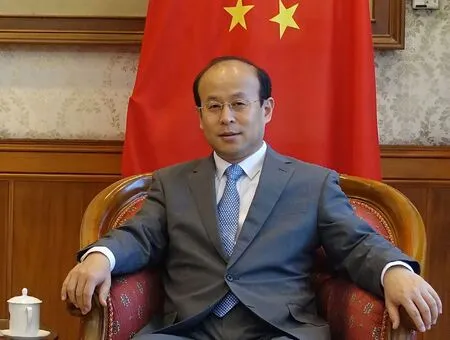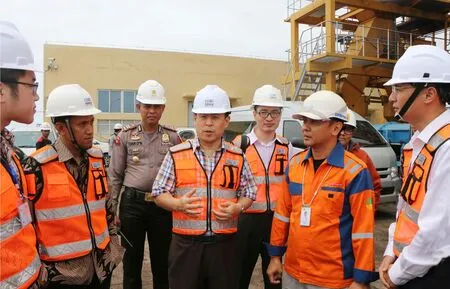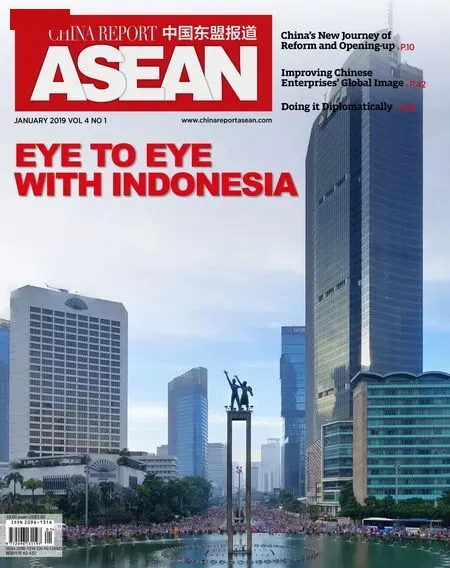BRIGHT PROSPECTS FOR CHINA-INDONESIA COOPERATION Exclusive interview with Chinese Ambassador to Indonesia Xiao Qian
By Wang Fengjuan, Wang Fang
China and Indonesia are good neighbors,good friends and good partners who share a long history of friendly exchanges.Indonesia was a hub on the ancient Maritime Silk Road. It is also where the vision of the 21st Century Maritime Silk Road was first proposed.
Along with bilateral cooperation between China and Indonesia, how will the 21st Century Maritime Silk Road effectively align with Indonesia’s vision of Global Maritime Fulcrum?What are the future opportunities for China and Indonesia to work together? What unique advantages does this bilateral relationship foster?
With such questions in mind, China Report ASEAN sat down for an exclusive interview with Xiao Qian, Chinese ambassador to Indonesia.
Xiao Qian: More than 2,000 years ago during the Han Dynasty (206 BC-AD 220), the people of China and Indonesia opened the door for exchange. The bond of friendship has connected countless people of the two countries throughout the ages. Indonesia was one of the first countries to establish diplomatic relations with the People’s Republic of China after its founding. In 1955, China and Indonesia, together with other Asian and African countries, jointly initiated the Bandung Spirit at the Bandung Conference, which promotes the principles of peaceful coexistence and seeking common ground while shelving differences and has made indelible contributions to construction of new international relations. Our two countries resumed diplomatic ties in 1990 and established a strategic partnership in 2005.
During President Xi’s 2013 visit to Indonesia, bilateral relations were upgraded to a comprehensive strategic partnership,which marked the start of a new phase for our bilateral relations. Over the last five years,thanks to the strong leadership of President Xi Jinping and President Joko Widodo, Sino-Indonesian relations have reached a new stage of solid and in-depth growth. Leaders of the two countries have maintained frequent mutual visits. President Xi visited Indonesia twice, and President Widodo visited China five times successively. In November 2018,the two heads of state held a seventh summit during the 26th APEC Economic Leaders’Meeting to guide development and increase the potential for bilateral relations. Earlier in May of last year, Premier Li Keqiang made a visit to Indonesia. The two sides further synergized development strategies. Signi ficant progress has been made on two landmark projects: the Jakarta-Bandung High-Speed Railway and the Regional Comprehensive Economic Corridors of Indonesia, both set to foster mutual bene fits and win-win results.

Chinese Ambassador to Indonesia Xiao Qian.
At present, cooperation between the two countries is rapidly expanding from traditional areas of infrastructure, resources and communications to emerging areas like industrial manufacturing, finance, e-commerce and arti ficial intelligence. Exchanges and cooperation in tourism, education, culture,media, think tanks, youth, religion, science and technology and sports have been fruitful. China has become Indonesia’s largest source of overseas tourists and the second largest destination for Indonesian students to study abroad. In 2017,Chinese pandas Cai Tao and Hu Chun settled in Indonesia to start a 10-year breeding program,which is building another bridge of friendship.
The two sides have continuously strengthened cooperation in major international and regional affairs. We have always cooperated closely and supported each other on major issues of mutual concern and on major issues of common interest to developing countries. China and Indonesia are both developing countries, emerging market economies and important countries in Asia.The healthy and stable development of Sino-Indonesian relations will not only bene fit the two countries, but also promote peace, stability and prosperity in the region and the world at large. China has always kept Indonesia high on its diplomatic agenda when seeking to develop ties with its neighbors. We are eager to maintain close high-level contact with Indonesia, promote cooperation in various fields and foster deeper development of bilateral relations.
China Report ASEAN: It has been five years since the Belt and Road Initiative (BRI) was first proposed. Indonesia was the location chosen to first share the vision of the 21st Century Maritime Silk Road. What efforts have China and Indonesia made on construction of the BRI?
Xiao: Indonesia was a hub on the ancient Maritime Silk Road. It is also where the vision of the 21st Century Maritime Silk Road was first proposed. Over the last five years, the two heads of state have held several summit meetings and reached important consensus on aligning the 21st Century Maritime Silk Road with Indonesia’s Global Maritime Fulcrum program. The two sides have achieved shared growth through discussion and collaboration based on openness,transparency and inclusiveness. The two countries officially kicked off construction of the Regional Comprehensive Economic Corridors of Indonesia as the second landmark project.In October 2018, leaders from both countries officially signed an MOU on integrating the BRI and the Global Maritime Fulcrum, marking a new step and a new stage of development of strategic cooperation. Positive progress has been made on a series of major cooperation projects such as the Morowali Industrial Park, which are already producing positive economic and social bene fits.
Over the last five years, Chinese investment in Indonesia has grown steadily. According to Indonesian statistics, China’s direct investment in Indonesia grew from US$300 million in 2013 to US$3.36 billion in 2017. China has jumped from the 12th place to the 3rd in Indonesia’s ranking of countries of origin of foreign investment. Presently, about 1,000 Chinese companies operate in Indonesia. While setting roots in the country to achieve their own development, they have brought along capital, technology and advanced management experience as well as contributing to local tax revenues and employment. Extensive analysis has shown that joint construction of the BRI and Global Maritime Fulcrum is in the fundamental interests of both countries and peoples.

On January 4, 2019, Chinese Ambassador to Indonesia Xiao Qian (center) visits Indonesia’s Takara Coal- fired Power Station built by China Gezhouba Group, recognizing the plant as an exemplary Chinese-contracted infrastructure project in Indonesia.
China Report ASEAN: What new opportunities will the BRI create for China and Indonesia?What are the unique advantages of this bilateral relationship?
Xiao: China and Indonesia are highly complementary in trade and have great potential for development. In 2017, bilateral trade volume reached US$63.3 billion, a year-on-year increase of 18.3 percent. Indonesia’s exports to China increased by 33 percent, helping to balance bilateral trade. From January to October 2018,bilateral trade volume reached US$63.7 billion,a year-on-year increase of 28 percent. China has the largest and fastest-growing middle-income group in the world. As China further expands its opening-up, it will import up to US$30 trillion in goods and US$10 trillion in services over the next 15 years, which will provide tremendous business opportunities for Indonesian enterprises.
新搬来的那个女人很漂亮,约莫二十岁出头,高挑的个头,瓷白的皮肤。每天傍晚的时候,她都喜欢穿着一条曵地的白色纱裙,像例行公事似的在院子里打理一小会儿花草,然后就回到那间亮着橙黄色灯光的屋子里弹钢琴。女人喜欢弹奏贝多芬的《致爱丽丝》和法国保罗·赛内维尔和奥立佛·图森共同谱写的那首《秋日思语》。一般情况下,女人在弹奏曲子的时候,我都会关掉灯,放下手里的事情,和大黑猫一起默不作声地伫立在窗前往对面的屋子里打量。
In November 2018, China hosted the first China International Import Expo (CIIE), which was attended by 43 Indonesian companies.Indonesian specialty products such as palm oil,bird nests, coffee, tropical fruits, desserts and jewelry were particularly popular. Contracts valued at US$720 million in total were signed during the expo. Some exhibitors have already reserved a place for the second session of the CIIE,requesting larger exhibition areas. The CIIE is a major Chinese initiative to open its markets wider to the world, which will bring new development opportunities for Sino-Indonesian trade. With the rapid development of information technology,Indonesia is becoming a favored destination for overseas investment in e-commerce, big data,cloud computing, arti ficial intelligence, mobile payments and other related fields, which provides broader space for bilateral cooperation.
China and Indonesia are both emerging market economies and major developing countries, with the world’s largest and fourthlargest populations, respectively, and both have huge development potential and broad markets.We see each other as development opportunities.I believe that joint efforts through the BRI and Global Maritime Fulcrum will create even more potential for bilateral cooperation in fields such as trade, investment, infrastructure and personnel exchange, which will bring tangible bene fits to the peoples of the two countries.
China Report ASEAN: At the Belt and Road Forum for International Cooperation in 2017,Indonesian President Joko Widodo suggested that Indonesia build Regional Comprehensive Economic Corridors. How could this initiative work with the BRI?
Xiao: The Regional Comprehensive Economic Corridors represent a landmark project of the second phase of joint development after the Jakarta-Bandung High-Speed Railway. The corridors cover four Indonesian provinces including Bali, which is well-known in China and throughout the world, North Sulawesi, which is known for the tourist hotspot of Manado,North Sumatra and North Kalimantan. Although the four provinces are located on the outlying islands of Indonesia, which are suffering an economic and development gap compared to Java, where Jakarta is located, each province has speci fic geographical advantages and rich natural and tourist resources.
Over the last year, pushed by leaders of the two countries, relevant authorities have worked closely together to gradually translate the initiative into concrete cooperation. Premier Li Keqiang and President Widodo witnessed the signing of an MOU on promoting cooperation on the development of Regional Comprehensive Economic Corridors during Premier Li’s visit to Indonesia in May 2018, officially kicking offthe project. At the end of October, the two sides signed an MOU to establish a joint steering committee, which marked a solid step forward for the cooperation mechanism.
By building the Regional Comprehensive Economic Corridors, the two sides have promoted cooperation from a strategic point of view. The principle of extensive consultation,joint contribution and shared bene fits has been observed. Since the beginning of the project, the Chinese side has maintained close communication with Indonesian counterparts and invited experts, enterprises and financial institutions to participate in in-depth exploration of potential areas and projects for cooperation. Under the principle of marketbased operation, we have worked to foster harmony by producing economic returns and contributing to society. We are pleased to see more and more Chinese enterprises interested in this cooperative project. I believe that through our joint efforts, the project will soon seize substantial progress and bring more bene fits to both sides.
China Report ASEAN: Thanks to the BRI, an increasing number of Chinese companies are doing business in Indonesia. What advice do you have for them?
Xiao: Over the last 20 years, I have had the privilege of promoting Sino-Indonesian relations extensively. I have felt great changes taking place in Indonesia’s economics and society, which have promoted political stability, economic development, social harmony and continuous improvement of the country’s international standing.Indonesia is a large country stretching more than 5,000 kilometers from east to west and 2,000 kilometers from north to south. It takes five hours to fly from the eastern edge to the west. It has a population of 260 million and very rich resources. This country has many opportunities for development. Chinese investors should gain a deep understanding of the opportunities here before they invest.
For Chinese companies already operating in Indonesia, I have this advice:
First, get familiar with the local business environment, strictly abide by local laws and regulations, respect local customs and habits,focus on preventing legal risk and learn to safeguard your legitimate interests through the law.
Second, improve localization of your operations. Aside from key posts, companies should employ as many local staffers as possible, increase investment in training and expand the pool of local talent.
Third, work more on public relations and marketing, make as many friends as possible and select reliable partners.
Fourth, strengthen the feasibility study of investment, improve the project full-cycle risk management, improve the quality of projects,products and services and establish a good reputation.
Last but certainly not least, Chinese enterprises must strengthen their cooperative abilities and capitalize on each other’s strengths to achieve common prosperity.

